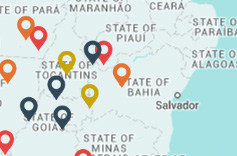Sons of Abassá Collective – Abassá de Oxum e Oxóssi
Defense and Guarantee of the Use of Sacred Lands in Greater São Paulo by traditional Afro-religious communities
São Paulo
Objetivos e público prioritário
The project will help defend areas sacred to the practitioners of traditional Afro-religious rituals in the São Paulo metropolitan region, who are threatened both by environmental racism and the institutional violence of municipal governments and other bodies.
Main activities
– Presentation of the project proposal together with networks, forums and leaders of worship areas in the metropolitan region of São Paulo;
– Mapping of sacred territories in conflict in the metropolitan region, together with the legislation that regulates them (Forest Reserves and Conservation Units, public and private);
– A grant program for staging debates with traditional Afro-religious practitioners and communities with the results of the mapping project;
– Three debates with the traditional Afro-religious community created through the grants. They will be held in the seven sub-regions of the city of São Paulo, together with networks, forums and leaders in order to guarantee access to the various communities;
– Negotiation with public authorities and land managers to normalize the use, preservation and permanence of these traditional communities at their sacred places;
– Production of a pamphlet that will include the map of territories and their characteristics, results of the debates, the grant program and any negotiations realized. Announcement and distribution of the pamphlet at the places of worship.
Context
Practitioners of Afro-religious rituals and their places of worship are the true guardians of African traditions in Brazil. These locations hold the sacred places that offer a connection with nature, since that is the principle of their tradition, as well as areas where the ancestors of these people lived and practiced their traditions, ceremonies, celebrations and family and friendship ties (forests, rivers, waterfalls, swamps, beaches, rocks, lakes, oceans, mangroves, caves, caverns).
Environmental racism leads to the expropriation of these grounds and sacred territories, justified by infrastructure projects, urban development, and allied with municipal legislation, such as city plans and criminalization of the collection of natural products.
About the organization
The Sons of Abassá Collective is a non-governmental organization constituted 47 years ago with the aim to form new, and defend existing, projects that preserve the Bantu culture and people. The organization seeks to reflect on various meanings of religious activity, in reference to political action, communitarianism, aesthetics, collectivization, musicality and corporality.
Partnerships
The Collective is a part of the National Bantu Movement – MONABANTU, Food and Nutritional Security Forum of Traditional African Faith Communities of São Paulo, the Black Youth Political Network, Afro-Leaders Network of Brazil – OEA and the National Youth Council (SG/PR).
Results
Regional meetings were held by practitioners of traditional Afro-religious rituals; demands were raised in person and through the web (allowing for the creation of a set of instruments helping to reach more places of worship); mapping was done of sacred territories in conflict in the metropolitan region, through regional meetings, together with the legislation that regulates them (consultancy); experts with academic backgrounds were assembled as consultants within the areas of sociology, environment and history in addition to traditional authorities on Afro-religious rituals; a grant program was initiated for debates with traditional Afro-religious practitioners regarding the results; a proposal was made regarding mechanisms which guarantee permanence, preservation and traditional use of the territories; and there were negotiations with public authorities and land managers to normalize the use, preservation and permanence of these traditional communities at their sacred places.
Funding Line
Annual Call for Proposals
Year
-
Total Granted
R$ 40,000
Duration
12 months
Main Themes
Confronting racism






